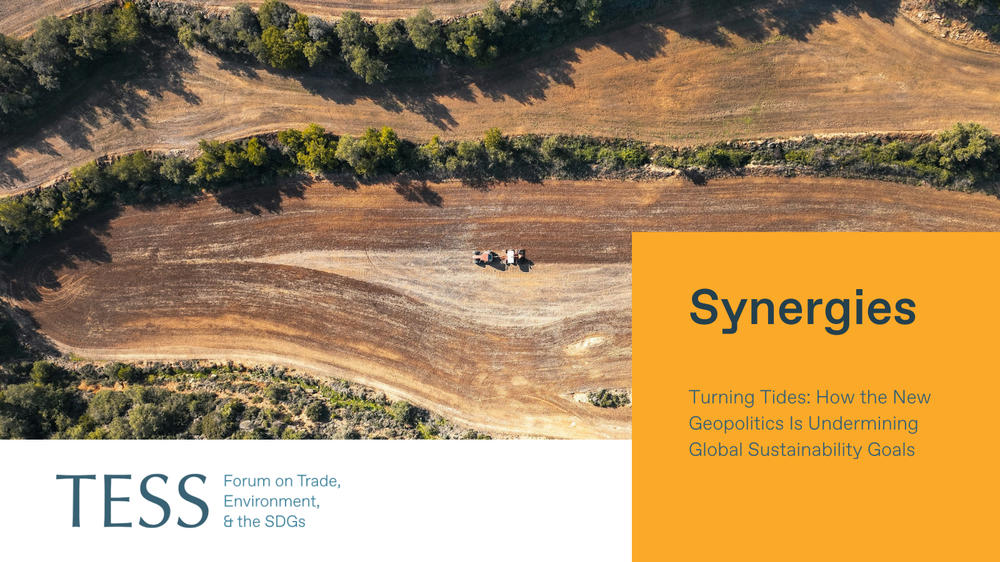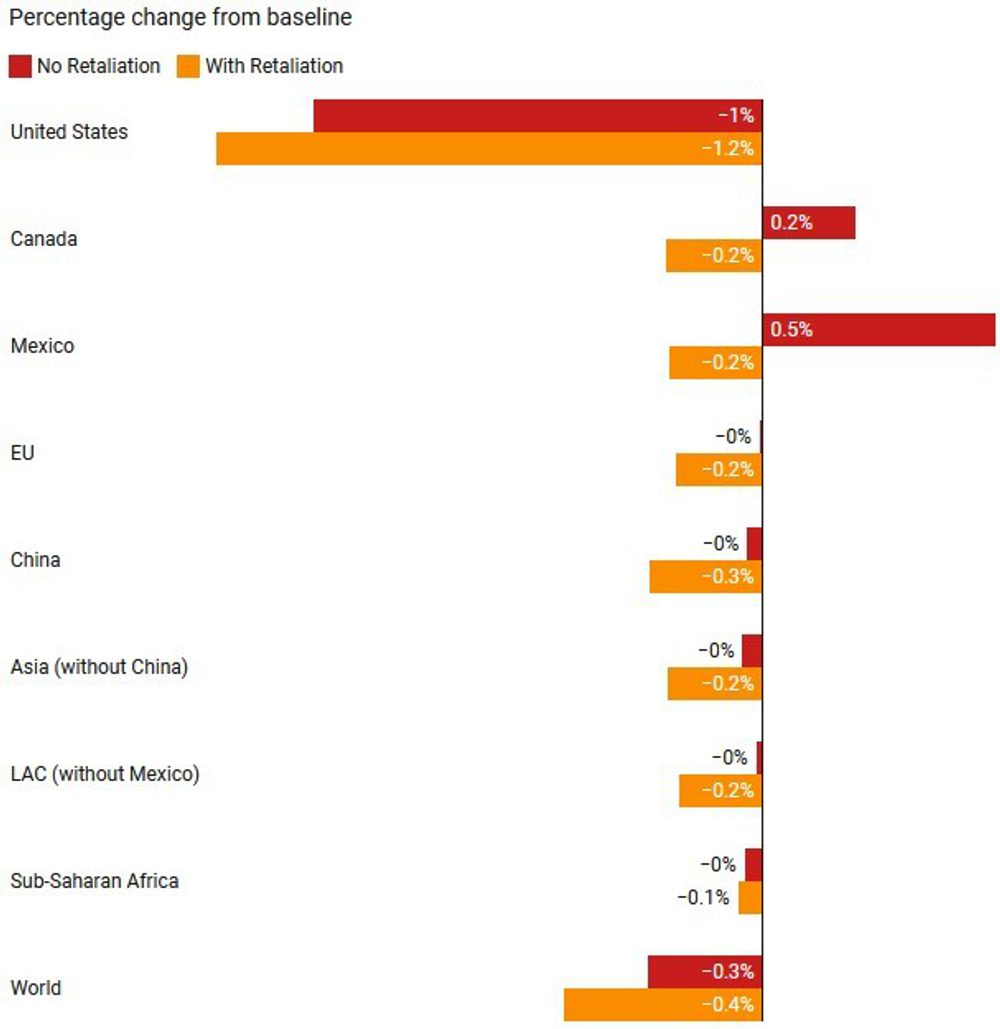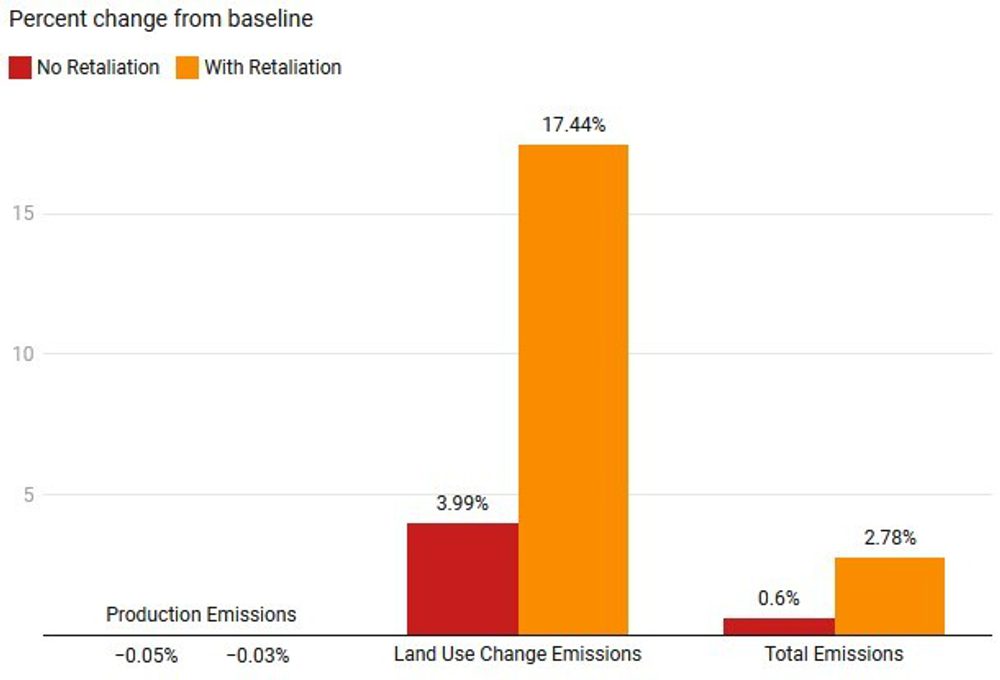Model results on the impacts of proposed US tariffs on national income and the environment illustrate that the current shift towards unilateralism and weakened multilateral cooperation threaten to erode the collective capacity to address global environmental crises.
This article is part of a Synergies series on climate and trade curated by TESS titled Addressing the Climate Crisis and Supporting Climate-Resilient Development: Where Can the Trading System Contribute? Any views and opinions expressed are those of the author(s) and do not necessarily reflect those of TESS or any of its partner organizations or funders.
-----

The year 2025 has marked a significant shift in the global political landscape, characterized by a renewed emphasis on unilateralism and national interest. The return of the Trump administration to the White House has reinforced a broader global trend in which major powers increasingly prioritize sovereignty and overt unilateralism over multilateral cooperation. This shift poses serious challenges for the international community’s ability to address climate change and pursue a coordinated sustainability agenda. In recent years, global collaboration led to key achievements—such as the Paris Agreement and joint efforts in green trade and finance—that reflected a shared commitment to environmental goals. However, the current trajectory suggests a move towards fragmentation, with rising trade tensions, new tariff regimes, retaliatory measures, and a general deprioritization of environmental commitments.
The growing disconnect between trade policy and sustainability objectives threatens to undermine previous progress and complicate efforts to implement climate-aligned strategies.
This growing disconnect between trade policy and sustainability objectives threatens to undermine previous progress and complicate efforts to implement climate-aligned strategies. Emerging green trade policies, including incentives for low-emission goods, are increasingly being viewed by exporting countries as perceived forms of protectionism, further deepening geopolitical divides. These developments create significant obstacles for low- and middle-income countries that rely on climate finance, access to global markets, and cooperative frameworks to achieve sustainable development.
Trade remains a potentially powerful tool for climate mitigation, as it allows for more efficient production patterns based on comparative advantages and natural resource endowments. However, protectionist measures—such as tariffs and trade barriers—distort market signals, reduce the efficient use of resources, and may drive agricultural expansion into ecologically sensitive areas, exacerbating deforestation and biodiversity loss. Moreover, by restricting access to global markets, such measures can limit the diffusion of sustainable technologies and practices, impeding the broader transition to climate-resilient and environmentally sound agri-food systems.
Model Results on the Impacts of Proposed US Tariffs on National Income and the Environment
Based on our forthcoming discussion paper, we analyze the implications of the “Liberation Day” scenario using an economy-wide model that captures global trade and income dynamics. This scenario introduces a 10% supplemental tariff by the United States on imports from nearly all trading partners, along with higher, country-specific tariffs on those with which the US runs the largest trade deficits. Our findings, illustrated in Figure 1, highlight that countries are generally better off avoiding imposition of their own retaliatory measures against the US in response to such unilateral actions (this analysis does not factor in the potential political impacts of counter-retaliatory actions). While the imposition of tariffs triggers significant trade diversion and a reconfiguration of global trade patterns, the overall transition entails costs—particularly as economies adjust to new trade relationships. Importantly, these emerging patterns are not guided by environmental efficiency or comparative advantage, but rather by arbitrary unilateral actions.
Figure 1. Impact of the Proposed US Tariffs on GDP

Source: Calculations by authors based on MIRAGRODEP simulations. Created with Datawrapper.
The scenario results in a broad contraction in global trade and GDP, with the US experiencing the most pronounced declines in exports, imports, and overall economic output. Although some countries see modest improvements in terms of trade and benefit from greater intraregional integration, these gains are insufficient to compensate for broader systemic inefficiencies, including disrupted supply chains. The European Union is one of the few regions to benefit meaningfully, capturing displaced trade flows, especially in sectors like pork and poultry meat, where high product standards align with demand in markets like Japan, China, and Mexico.
Crucially, the trade realignments that emerge from the Liberation Day scenario are not the result of a coordinated international strategy to improve environmental outcomes or promote sustainability. Instead, they reflect a reactive and fragmented adjustment to geopolitical tensions, where new trade patterns are shaped by strategic interests, retaliatory dynamics, and shifting alliances. This geopolitical-driven restructuring risks sidelining climate goals and undermining opportunities to use trade as a mechanism for environmental improvement, potentially locking countries into less efficient and less sustainable production and trade systems over the long term.
The implementation of the proposed US tariffs would yield mixed GHG emission outcomes (Figure 2). In both scenarios, production GHG emissions would decline modestly, by 0.05% without retaliation and 0.03% with retaliation, reflecting reduced agricultural output. In contrast, land use change GHG emissions would rise substantially, increasing by 4% in the absence of retaliation and by over 17% when retaliation is present. These increases suggest a shift in production towards more land-intensive or environmentally sensitive regions, potentially exacerbating deforestation and biodiversity loss. Consequently, total GHG emissions from agriculture and land use rose by approximately 0.6% in the no-retaliation scenario and by nearly 2.8% under retaliation. These findings indicate that reciprocal US tariffs are likely to increase the overall environmental burden, with retaliatory trade measures potentially exacerbating this effect.
Figure 2. Impact of the Proposed US Tariffs on the Environment

Source: Calculations by authors based on MIRAGRODEP simulations. Created with Datawrapper.
Reaffirming International Cooperation as a Cornerstone of Environmental and Economic Policymaking
Sustaining global progress requires inclusive, coordinated strategies that integrate trade and sustainability goals, and resist the fragmentation that risks undoing hard-won achievements.
Trade restrictions and protectionist policies can undermine environmental sustainability, particularly within the agricultural sector. By distorting market incentives, such measures may lead to inefficient resource allocation and encourage agricultural expansion into ecologically sensitive regions, contributing to deforestation and biodiversity loss, consistent with the observed substantial increases in land use change GHG emissions illustrated in Figure 2, which would rise by up to 17% under retaliation.
Additionally, protectionism can hinder the adoption of sustainable practices by limiting access to international markets, which often incentivize higher environmental standards. This isolation reduces opportunities for technology transfer and weakens the mechanisms that support climate-resilient and environmentally friendly agriculture. Furthermore, trade restrictions can exacerbate food insecurity by driving up prices and reducing the availability of diverse food products, disproportionately impacting vulnerable populations.
In contrast, well-designed trade and trade-related policies—complemented by strong environmental safeguards—can facilitate the diffusion of green technologies, promote more sustainable production systems, and provide incentives for meeting higher environmental benchmarks. Trade policy, therefore, must be aligned with sustainability objectives to support climate action.
The current shift towards unilateralism and rising geopolitical tensions poses an additional challenge to achieving these goals. The weakening of multilateral cooperation threatens to erode the collective capacity to address global environmental crises. Without coordinated action and trust among nations, it is unlikely that international climate and sustainability targets for 2030 and beyond will be met. This is particularly concerning for countries most vulnerable to climate change, which may face growing isolation and reduced access to adaptation support.
To counter these trends, there is an urgent need to reaffirm international cooperation as a cornerstone of environmental and economic policymaking. Sustaining global progress requires inclusive, coordinated strategies that integrate trade and sustainability goals, and resist the fragmentation that risks undoing hard-won achievements.
----------
Valeria Piñeiro is the Regional Representative for Latin America and the Caribbean (LAC) in the Markets, Trade, and Institutions Unit, International Food Policy Research Institute (IFPRI).
Joseph Glauber is a Research Fellow Emeritus in the Director General’s Office, International Food Policy Research Institute (IFPRI).
Juan Pablo Gianatiempo is a Research Analyst with the Markets, Trade, and Institutions Unit, International Food Policy Research Institute (IFPRI).
-----
Synergies by TESS is a blog dedicated to promoting inclusive policy dialogue at the intersection of trade, environment, and sustainable development, drawing on perspectives from a range of experts from around the globe. The editor is Fabrice Lehmann.
Disclaimer
Any views and opinions expressed on Synergies are those of the author(s) and do not necessarily reflect those of TESS or any of its partner organizations or funders.
License
All of the content on Synergies is licensed under a Creative Commons Attribution-NonCommercial-ShareAlike 4.0 International (CC BY-NC-SA 4.0)
license. This means you are welcome to adapt, copy, and share it on your
platforms with attribution to the source and author(s), but not for
commercial purposes. You must also share it under the same CC BY-NC-SA
4.0 license.
If you would like to reuse any material published here or if you have any other question related to Synergies, send an email to fabrice.lehmann@graduateinstitute.ch.






